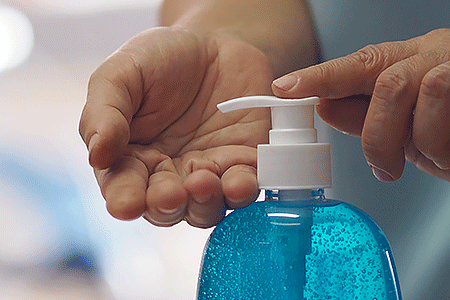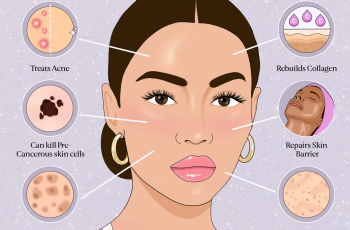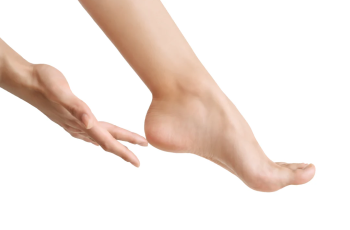Try these hands-down best tips to care for your digits’ delicate skin
You use them all day, every day, but are you giving your hands the TLC they need? Much like your face, your hands are exposed to the elements more than the other parts of your body. Plus, they’re always in motion: typing on a computer keyboard, taking care of your children, cooking dinner, cleaning up the latest mess, and the list goes on. In 2020, we put our hands through even more, with more frequent washing and sanitizing to prevent the spread of COVID-19.
The result of not properly pampering your hands? “If you want to know someone’s age, don’t look at their face, look at their hands,” says board-certified dermatologist Diane S. Berson, MD, FAAD, an associate professor of dermatology at Weill Cornell Medicine-New York Presbyterian Hospital. Once the barrier is compromised—from frequent wetting and not moisturizing enough—Dr. Berson says irritants, allergens, and even infectious particles are more likely to penetrate our skin. This could cause rashes, itchy patches, and other issues. “Severely dry skin can develop cracks—some of which can become deep—and subsequent infections,” she adds.
To give your hands the care they crave, deserve, and need, follow these four dermatologist-recommended tips:
- Carry hand cream with your sanitizer
By now, you’re used to the routine of spritzing hand sanitizer every time you touch a surface in public and washing your hands the moment you return home. Though it’s smart to follow the Centers for Disease Control and Prevention recommendations, it’s also putting mega stress on your hands. In fact, Dr. Berson says the same wintertime symptoms, like drying or irritation, can pop up with frequent cleansing and scrubbing.
“Antimicrobial cleansers can often be more drying, and sanitizing gels containing alcohol can strip the skin of our bodies’ naturally moisturizing oils,” she explains. They can also potentially exacerbate chapping, irritation, and eczema. Every time you use a sanitizer or wash, apply a moisturizer, too. This will help to repair the damage—and keep your skin smooth. Using moisturizer after handwashing does not negate your handwashing efforts. Even if your hands are dry from frequent washing, continue washing them to help prevent the spread of COVID-19.
- Protect your hands from changing temperatures
As the temperature drops, the heat indoors goes up. This makes the air within your home and out in the world drier than in other seasons, causing your hands to become chapped, red, itchy, and in some cases, scaly. This can be uncomfortable for everyone, but particularly for those who suffer from painful skin conditions, like eczema. To protect your hands, Dr. Berson recommends investing in a fragrance-free, dye-free hand cream or ointment. Look for products that contain lipids (like ceramides), humectants (like glycerin and hyaluronic acid), and occlusives (like mineral oil or petrolatum). When these superstar ingredients work together, they ensure your skin is moisturized and hydrated, even on the year’s coldest day. Use products that you squeeze out of a tube, as these are more effective than thinner lotions you pump out of a bottle.
“Moisturizing creams should be used more frequently [in cold weather], especially after wetting the hands,” Dr. Berson adds. Apply your moisturizer when your skin is still damp after bathing or handwashing, or whenever it feels dry.
- Apply sunscreen
It seems obvious, but we forget that the sun’s ultraviolet radiation doesn’t discriminate where it lands, and any exposed skin is at risk. When you don’t protect your hands from these harmful rays, Dr. Berson says, you can develop discolored spots (called lentigines or age spots), roughness, wrinkling, and dryness. Hands are also prone to developing precancerous spots called actinic keratoses (AKs), which can turn into squamous cell carcinoma, the second-most-common type of skin cancer.
To ward off these early signs of aging and protect your health, she recommends applying daily sunscreen year-round to all skin not covered by clothing—including your hands— when you are going to be outside. “There are brands that have sunscreens targeted for the body rather than face, often a lotion that spreads easily. But the most important thing is for your sunscreen to be broad-spectrum, water-resistant, have an SPF of at least 30, and spread well for even application prior to going out in the sun.”
- Give your hands the star treatment at night
When settling into an evening of self-care that includes comfy pants and a cozy drink, add a hand-care step to your routine. Dr. Berson recommends soaking your hands in warm water or milk before applying a cream or ointment to seal in moisture. Then, put on cotton gloves. Turn on your humidifier before tucking yourself in, and let the cream do its magic overnight. In the morning, you’ll wake with silky, healthy hands ready to tackle whatever the day—or 2021—has in store.
After all your hands do for you, aren’t they worth the extra care? We think so.
DQH Knowledge drop: In your 20s, your skin cell turnover decreases. (Cell turnover is a key component in keeping your skin youthful.) You know what else slows down? Your collagen production. Starting in your 20s, collagen decreases by about 1 percent per year. Should you want to prevent fine lines and wrinkles, start by eliminating behaviors that contribute to premature aging. “If it’s bad for you, it’s bad for your skin,” says dermatologist Michel Somenek.
“Cigarette smoking reduces blood flow to the skin and causes premature wrinkling and a dull skin texture. Making the repeated pursed motion to inhale can also cause smoker’s lines. Alcohol and recreational drugs are toxins for the skin that damage its cellular structure and DNA,” Somenek tells us. “The faster you eliminate vices while you are young, the better chance your skin and body have to recuperate.” Also, adopting an anti-aging routine in your 20s is key. After all, the best offense is a good defense. We spoke to Somenek and experts Joshua Ross and Audrey Kunin to find out more.
Keep reading for the best anti-aging products for your 20s, according to skincare professionals.
Sunscreen
“We all know that the sun is the number one cause of skin aging and starting the prevention in your 20s is very important,” Ross says. “The majority of your sun damage won’t start to appear until you’re in your 30s, so don’t wait until you see it surface or you’ll be behind the curve. Stay ahead of it with a good-quality zinc-based sunscreen worn daily.”
Farmacy Green Defense Daily Mineral Sunscreen
An invisible sunscreen with SPF 30, plus botanical extracts meant to protect skin with tons of antioxidants. Bonus: It’s clean and fine to use under makeup.
Bareminerals Complexion Rescue™ Tinted Moisturizer Broad Spectrum SPF 30
Although we recommend you use your SPF and moisturizer separately, we also understand moments when you don’t have time or energy for that extra step. For those times, this bareMinerals moisturizer is a great thing to have on hand.
Vitamin C Serum
“A great introduction to anti-aging is to start with a vitamin C serum in your morning skincare routine,” Ross says. “It’s a powerful antioxidant that will neutralize free radicals and brighten the skin.” He adds that it’s a great way to counteract the effects of the sun’s harmful rays, which, as previously mentioned, are among the biggest causes of premature aging.
Drunk Elephant C-Firma™ Vitamin C Day Serum
The Drunk Elephant C-Firma is a lightweight serum that promises to give skin a glow by combining the brightening powers of vitamin C with ferulic acid, l-ascorbic acid, and vitamin E. The included sodium hyaluronate is meant to replace hydration loss, so you shouldn’t have to deal with any irritation.
Sunday Riley C.E.O. Rapid Flash Brightening Serum
This potent serum is jam-packed with vitamin C (15 percent, to be exact), which means it’s a potential superstar at both brightening skin and dousing it in antioxidants.
Peptides
Using peptides on your skin has many benefits, says Somenek. “The skin barrier is what defends the body against pollution, UV rays, bacteria, and toxins. It can be damaged by several everyday factors. Using topical peptides aids in building a stronger barrier,” he says. “Peptides comprise elastic fibers, which are a type of protein. These fibers help to make skin appear taut and firm. Peptides can also help repair damaged skin, relieve inflammation, and even out skin tone. Some peptides can kill acne-causing bacteria that is common in 20-somethings.”
Kunin agrees, saying, “Peptides are an excellent entry point for supporting collagen.” She recommends looking for face and eye treatments that contain these collagen-boosting powerhouses.
Charlotte Tilbury Magic Eye Rescue Cream
This Charlotte Tilbury super-emollient eye cream has a base of coconut oil and shea butter (read: it’s incredibly hydrating). Botanicals plus peptides are meant to help reduce dark circles and boost collagen, respectively.
This creamy moisturizer serves up potent collagen-boosting peptides and pycnogenol, and antioxidant-rich vitamin C. “Instead of sitting on top of the skin, peptides penetrate the outer layer so they go deep. The ‘signals’ they send tell the cells to produce elastin and collagen, which are needed for youthful-looking skin,” explains Somenek.
At-Home Peel Pads
Remember that skin cell turnover fiasco we talked about earlier? One way to help support it is by exfoliating. “Exfoliation is important to help keep skin fresh and luminous,” Kunin says. She recommends using at-home peel pads as an easy and effective way to exfoliate.
“The goal in your 20s is to fight the slowing pace of cell turnover. It is wise to use products that gently exfoliate, yet still remove oil and other impurities. Products that have Alpha Hydroxy Acids (AHA) or Beta Hydroxy Acids (BHA) are a good choice.”
According to Somenek, you should only exfoliate two to three times a week. “People of all ages are guilty of over-exfoliating and that can be too much of a good thing,” he says.
Dermadoctor Kakadu C Intensive Vitamin C Peel Pad
A few swipes of this Derma Doctor powerful peel pad promise to leave your skin glowing and smooth, thanks to the seven (yes, seven) types of chemical exfoliants, including AHA and BHA. It also contains vitamin C via Kakadu plum extract for added brightening and antioxidant protection.
KEY INGREDIENTS Kakadu plum extract is sourced from the Kakadu plum, a fruit grown in northern Australia. It contains vitamin C, which restores the skin’s natural barrier, increases collagen production, and soothes irritation.
Dr. Dennis Gross Skincare Alpha Beta® Universal Daily Peel Pads
These are the gold standard of peel pads, with a cult following and over 900 five-star reviews on Sephora. They’re easy to use and contain a blend of anti-aging exfoliating acids.
Emollient Night Cream
“In your 20s, you need to start upping the hydration in your skincare routine. You may have been cautious of over-moisturizing because of acne in your teens, but as you enter your 20s, your skin transitions and becomes drier,” Ross says. “I recommend an emollient night cream added into your evening skincare regimen.”
“Twenty-somethings need to make sure that they are not using creams that will clog their pores and cause excess oil production,” says Somenek. Opt for non-comedogenic products.
Cerave Skin Renewing Night Cream
One great choice is the CeraVe Skin Renewing Night Cream, which is a non-comedogenic night cream that leaves skin soft and glowy. It combines the moisturizing powers of ceramides and hyaluronic acid.
RoC Retinol Correxion Max Hydration Creme
“The best night cream ingredients contain retinol, benzoyl peroxide, and/or salicylic acid or hyaluronic acid. The goal is to moisturize, yet remove excess oil,” says Somenek. This Roc Retinol Correxion cream fits the bill as it contains both hyaluronic acid and retinol so it promises to moisturize while also being non-comedogenic.



